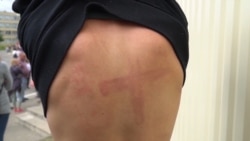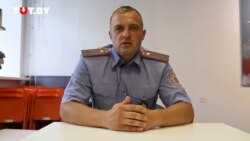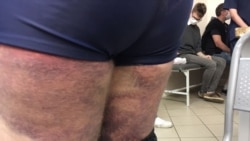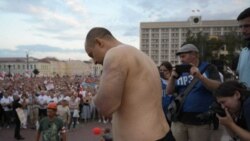Artyom Vazhenkov said that when darkness fell at the notorious detention center in the Belarusian capital of Minsk where he was held for several days, the screaming from those being tortured echoed into the night.
"It was horrible -- not what I saw, but what I heard" Vazhenkov said in an interview with Current Time after his release. "At night, from our window outside we could hear people howling, screaming."
Now back in Moscow, Vazhenkov described the torture, abuse, and inhumane conditions that he and others held at the Okrestina detention center endured.
Some 7,000 people have been detained in the protests that erupted across Belarus after longtime President Alyaksandr Lukashenka was declared winner of the country's presidential election on August 9. In Minsk, many have ended up at Okrestina and have spoken of and documented on social media the physical abuse they suffered while held there.
Thousands have been released, but hundreds remain locked up.
Amnesty International and local human rights groups have collected testimony from protesters in Belarus who describe being tortured or subjected to other ill-treatment in such facilities, including being stripped naked, beaten, and threatened with rape.
The international human rights organization says detention centers across Belarus have become "torture chambers."
As evidence of abuse at prisons and on the streets mounted, some Belarusian police and other security service members have quit, with many documenting the move on social media by throwing their uniforms into the trash or other similar gestures.
In an unusual move, a senior police officer in Lida denounced the "cruelty and brutality" meted out by security forces against protesters in Belarus.
In a video on the independent Tut.by news site, Yury Makhnach, a police lieutenant colonel in Lida, said police reacted brutally because they had been told they would face reprisals if the opposition prevailed.
Belarusian state media said Vazhenkov, a coordinator for Russia's Open Society, an opposition organization funded by former Russian tycoon Mikhail Khodorkovsky, who came to monitor the vote, was detained on August 11 with another Russian national, Igor Rogov, allegedly showing "signs of alcohol intoxication."
Vazhenkov was suspected of planning "mass unrest," but was released with no charges filed on August 15. According to TASS, Rogov was released and returned to Moscow on August 12.
Now back in Moscow, Vazhenkov told Current Time, the Russian-language network led by RFE/RL in cooperation with VOA, what he experienced and witnessed.
"On the first day, they didn't give us water and didn't let us go the toilet," Vazhenkov recounted. "They would come in and just beat us. Just for fun. They'd say, 'This is the way we are reeducating you animals.' We were constantly forced to lie on the floor."
Besides the beatings, Vazhenkov and others were forced to kneel for hours on the concrete floor with their foreheads bowed to the ground. "The whole body was generally just numb; people were really moaning in pain," he said.
Nearly "any action" would trigger the guards to violently lash out, according to Vazhenkov. "Anything you said triggered an aggressive reaction," he explained. "‘Can I have water?' -- aggressive reaction. 'We need to go to the toilet' -- aggressive reaction. These situations didn't always end in beatings, but every word we uttered was met by insults and humiliation."
He said one of the more extreme forms of torture he witnessed was the so-called swallow, when a detainee is handcuffed behind his back and elevated. "This is guaranteed to cause dislocations," Vazhenkov said.
He said another extreme form of abuse was the "walk down the corridor." "This is when a naked person walks down a hallway with riot police standing on either side of the corridor, beating them with truncheons, hitting them all over," Vazhenkov described.
Besides the physical abuse, the guards subjected the detainees to constant humiliation.
"In the cell, for example, they kept everyone in their underwear for some reason. Moreover, there was one case in which a young man was taken to court in his underwear and sentenced to 14 days," Vazhenkov said. "He was taken out of the cell and led, as he said and as I understood, down the street in the swallow pose in his underwear to the courthouse, which was nearby."
The spirits of those held inside were raised by the support they heard coming from those gathered outside Okrestina, most of them seeking information about loved ones inside.
"We heard that people on the other side of the wall supported us and shouted: 'Hang on! Hang on! We are with you!' I remember once some girl shouted: 'Vanya, I love you! When you get out, we will get married!' It was really touching," Vazhenkov recounted, adding that even these moments of hope triggered fears as well.
"On the one hand, this gave us hope, but, on the other hand, it pissed off the police, and we feared they would take out their anger and aggression on us," he said.
Vazhenkov's account echoes those of other former detainees.
According to accounts collected by Amnesty International, detainees in Minsk and elsewhere in Belarus were "severely beaten for the entire duration of their detention."
"Former detainees told us that detention centers have become torture chambers, where protesters are forced to lie in the dirt while police kick and beat them with truncheons. They described being stripped naked and subjected to sadistic beatings while listening to the screams of other victims," said Marie Struthers, Amnesty International's director for Eastern Europe and Central Asia. "These are people whose only 'crime' was to take to the streets in peaceful protest."
Lida police officer Makhnach offers a glimpse at what may have motivated police.
"The ideology was this: if the authorities lose, then each of us will be hanged on a tree branch by the side of the road," he explained in the video uploaded to Tut.by, adding that 13 police officers in Lida had stepped down. "Therefore, the authorities must be protected by any means."
"I am ashamed to wear the epaulets of a police officer," he continued. "I devoted 23 of the best years of my life to the service -- and I never could have thought that it would turn out this way. That we [police] will begin to treat the people of our country with cruelty and brutality."









